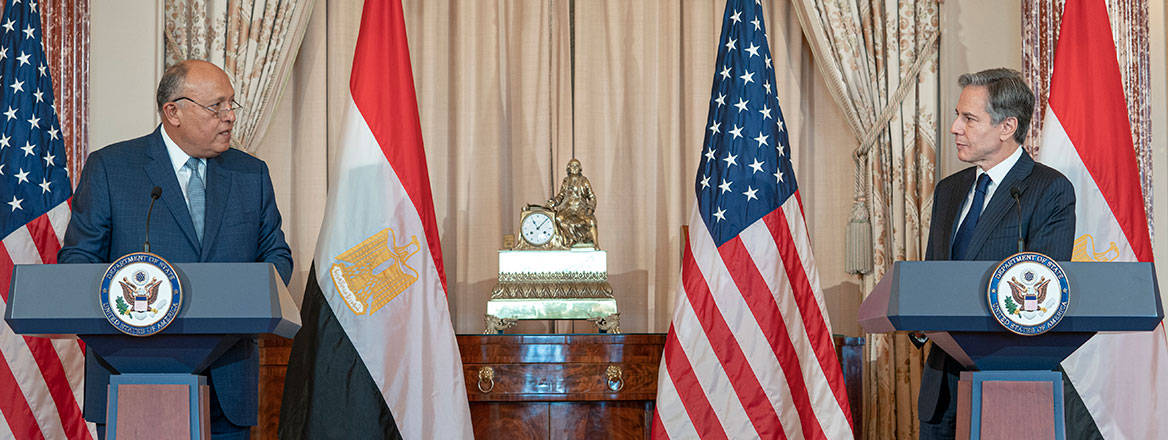Egypt’s Stance on the Iran Talks: Positive but Pragmatic
While Cairo may well support US efforts to encourage Iran back to the nuclear deal, this does not mean it will be willing to engage in further actions to compel Tehran should the talks fail.
As one of the wider Arab world’s historical powerhouses, it is often expected that Egypt might have particularly strong and unique concerns about Iran, particularly regarding the latter’s attempt to develop a nuclear programme. Such an expectation would be bolstered by Cairo’s alignment with the United Arab Emirates (UAE) and Saudi Arabia on multiple files, given Abu Dhabi’s and Riyadh’s deep apprehensions vis-à-vis Tehran. But international efforts, mainly led by the US, to entice Tehran back to the Joint Comprehensive Plan of Action (JCPOA) remind observers that while geopolitical alignments might explain and predict certain outcomes, they do not always cover all angles sufficiently.
From the outset, it is clear Cairo is not as involved in the anxieties around Tehran. This should not surprise any experienced observer of Egypt and its regional stance. While it is absolutely the case that Cairo is strongly allied with Riyadh and Abu Dhabi versus, for example, Turkey and Qatar, and has invested itself in that pole of influence over the Turkish-Qatari axis, this does not mean that Cairo is supportive of all the policies or stances of the Saudi-UAE bloc. For years, it was clear that Cairo had a different position on Syria and its ongoing civil war to Abu Dhabi and Riyadh, although their positions have now become a good deal closer. When it comes to Yemen, Cairo resisted the aspirations of Saudi Arabia to have Egyptian troops participate in Riyadh’s operations in Yemen, despite the importance that Saudi Arabia and the UAE placed on the Yemeni conflict. Cairo certainly views the security of the countries of the Gulf Cooperation Council (GCC) as paramount regionally speaking, but that does not translate into having quite the same policies.
This might seem surprising given the historical context of Egyptian–Iranian relations, and Cairo’s view of most political Islamist movements in the region. After all, when the Iranian revolution took place in 1979, Cairo’s close ally, Iran’s Shah Mohammad Reza Pahlavi, took refuge in Cairo, where he stayed until the end of his life. Ayatollah Ruhollah Khomeini’s government in Tehran also did not take kindly to Cairo’s peace agreement at Camp David with the Israelis, which only increased the level of tension between the two countries, in addition to Tehran’s antipathy towards Cairo for its close relationship with the US. Indeed, Iran’s rulers even named a street in Tehran after the assassin of Egyptian president Anwar Sadat, who signed the peace deal with the Israelis. Cairo’s historical antagonism towards most non-state political Islamist actors would not have made Tehran, ruled by a revolutionary – if deeply contested – interpretation of Shi’i Islam, a natural ally in the region in any case.
Cairo generally favours a predictable status quo in regional affairs, rather than taking risky moves that could result in a variety of unpredictable outcomes
However, Cairo’s regional stance is usually a conservative one, which owes more to pragmatism than it does to adventurism and escalation. Cairo generally favours what it interprets to be a predictable status quo in regional affairs, rather than taking risky moves that could result in a variety of unpredictable outcomes. On occasion, Cairo will intervene when another regional actor has engaged in what it perceives to be more adventurist moves, to try to check negative impacts on Egypt, but generally only when it perceived those impacts to be direct and immediate. Hence, when Iran intervened in Syria, Cairo did not intervene in response; but when it came to Libya, which is on Egypt’s border, the situation was somewhat different.
As such, Cairo might well support US efforts to encourage Iran back to the JCPOA, as it sees in the agreement a process that avoids an escalation in tensions over regional matters. But this does not mean that Cairo will be willing to engage in further actions to compel Iran if such efforts fail, despite the likely desire of its regional allies in Abu Dhabi and Riyadh to do so.
Cairo has engaged a great deal on nuclear non-proliferation in regional and international fora, including in organisations like the UN, and generally supports such efforts. But its preferred mode of engagement has always been in multilateral diplomatic fora, in a pragmatic fashion. If the JCPOA negotiations completely fall apart, Cairo will likely be unfavourable towards any aggressive moves by either the US or its regional allies in the GCC to force Iran into an alternative agreement, even if it views Iran’s continued attempts to develop its nuclear programme with disdain.
The views expressed in this Commentary are the author’s, and do not represent those of RUSI or any other institution.
Have an idea for a Commentary you’d like to write for us? Send a short pitch to commentaries@rusi.org and we’ll get back to you if it fits into our research interests. Full guidelines for contributors can be found here.
WRITTEN BY
Professor H. A. Hellyer
RUSI Senior Associate Fellow, RUSI International
- Jim McLeanMedia Relations Manager+44 (0)7917 373 069JimMc@rusi.org


